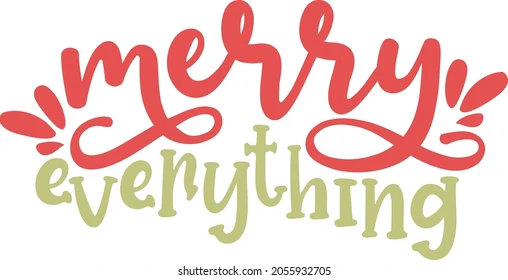Have you ever heard someone say “merry everything and happy always” and wondered what it means? This beautiful phrase is like a warm hug made of words. It means wishing someone happiness not just on special days like birthdays or holidays, but every single day of their life. When we say “merry everything and happy always,” we are telling someone that we want them to feel joy in everything they do and to stay happy forever and ever. It is a special way of spreading love and kindness through simple words that everyone can understand. This wonderful saying reminds us that happiness is not just for special occasions but something we can share and enjoy all the time.
The word “merry” means feeling happy, joyful, and full of fun. When you hear Christmas carols singing about being merry, they are talking about feeling excited and cheerful. The word “everything” means all things – big and small, important and simple. When we put these words together with “happy always,” we create a magical wish that covers all moments in life. This phrase became popular because people wanted a way to wish others well that was bigger than just saying “happy holidays” or “merry Christmas.” They wanted something that included every celebration, every regular day, and every moment in between. It is like giving someone a gift of good wishes that never runs out and never expires.
The Story Behind This Happy Phrase
The phrase “merry everything and happy always” started appearing on greeting cards, holiday decorations, and social media posts in recent years. People loved it because it felt more inclusive and warm than traditional sayings. Instead of limiting good wishes to one holiday or one time of year, this phrase opens its arms wide to include everyone and everything. It became especially popular during winter holidays when families and friends gather together to celebrate different traditions. Some people celebrate Christmas, others celebrate Hanukkah, Kwanzaa, or other special days, and some people just enjoy spending time with loved ones without any particular holiday. This phrase works perfectly for everyone because it does not leave anyone out.
The beauty of saying “merry everything and happy always” is that it recognizes that different people celebrate different things, and all of these celebrations are wonderful and important. A child might celebrate getting a good grade at school, a parent might celebrate a new job, and a grandparent might celebrate watching their family grow. All of these moments deserve to be merry, and all of these people deserve to be happy always. When we use this phrase, we are telling others that their happiness matters to us no matter what they are celebrating or when they are celebrating it. This creates a feeling of togetherness and acceptance that makes the world a friendlier and kinder place for everyone to live.
Why Being Merry and Happy Matters So Much
Happiness is like sunshine for our hearts and minds. When we feel happy, everything seems brighter, problems seem smaller, and life feels more wonderful. Scientists who study feelings have discovered that when people are happy, their bodies work better, they get sick less often, and they live longer, healthier lives. Being merry and joyful also helps our brains work better, making it easier to learn new things, remember important information, and solve tricky problems. Children who grow up in happy homes where people smile and laugh together often do better in school and make friends more easily. This is why wishing someone to be “merry everything and happy always” is actually wishing them good health, success, and a wonderful life.
When we are happy, we also make other people around us feel happy too. Have you ever noticed that when someone smiles at you, you want to smile back? That is because happiness spreads from person to person like ripples in a pond when you throw a stone into the water. If you feel merry and joyful, your friends and family will notice, and they might start feeling happier too. Then they might make other people happy, and those people might make even more people happy. Before you know it, one person’s happiness has touched dozens or even hundreds of people. This is why the phrase “merry everything and happy always” is so powerful – it is not just about one person being happy, but about creating waves of happiness that travel far and wide across the world.
Simple Ways to Be Merry Every Single Day
Being merry and happy does not require expensive toys, fancy trips, or special occasions. Some of the happiest moments in life come from simple, everyday things that cost nothing at all. One way to feel merry is to notice the beautiful things around you – like colorful flowers growing in a garden, fluffy clouds floating in the blue sky, or birds singing their cheerful songs in the morning. When you take time to look at these wonderful things and feel grateful for them, happiness grows in your heart. Another way to be merry is to do something kind for another person, like helping your mom carry groceries, sharing your crayons with a friend, or giving someone a compliment that makes them smile.
Playing and having fun is another important way to feel merry every day. Whether you are running around outside, drawing pictures, building with blocks, or playing pretend games, playtime fills your heart with joy and laughter. Even grown-ups need playtime! When adults do things they enjoy, like reading books, gardening, cooking, or playing sports, they feel happier and more energetic. Spending time with people you love is also a wonderful way to feel merry. Talking, laughing, hugging, and just being together with family and friends creates warm, happy feelings that stay with us long after those special moments end. When we make being merry a daily habit rather than something we save for special days, we live the true meaning of “merry everything and happy always.”
Teaching Children About Happiness and Joy
Children learn about happiness by watching the adults around them and by experiencing joyful moments themselves. When parents, teachers, and caregivers show children how to find happiness in simple things, they give them a gift that lasts forever. Teaching a child to say “merry everything and happy always” helps them understand that they can wish good things for others and that spreading happiness is important. Parents can help children practice being merry by celebrating small victories, like learning to tie their shoes, finishing their vegetables, or being kind to a sibling. These little celebrations show children that happiness comes from many places, not just from big events like birthdays.
Reading stories about kind characters who help others, playing games that require teamwork and sharing, and talking about feelings openly all help children understand what happiness means. When a child feels sad, scared, or angry, adults can help them learn that these feelings are okay and that happy feelings will come back again. This teaches children that being “happy always” does not mean never feeling sad – it means knowing that happiness is always possible and always worth seeking. Arts and crafts, music, dancing, and outdoor play are all wonderful activities that naturally create merry, joyful feelings in children. When children grow up learning to find and create happiness, they become adults who can spread the message of “merry everything and happy always” to the next generation.
How Saying Kind Words Changes the World
Words have incredible power to make people feel good or bad, happy or sad, brave or scared. When we choose to use kind, positive words like “merry everything and happy always,” we use our power to make the world better. Imagine if everyone started their day by wishing others to be merry and happy – how different would our schools, neighborhoods, and cities feel? Kind words cost nothing, take only seconds to say, and can change someone’s entire day. A person who is feeling lonely might feel loved when someone wishes them well. Someone who is struggling might feel encouraged and hopeful. A child who is scared might feel braver knowing that someone cares about their happiness.
The phrase “merry everything and happy always” is especially powerful because it is not just a quick “have a nice day” – it is a deeper wish that someone’s whole life will be filled with good things. When we take the time to say these words to others, we show them that we care about them not just today but always. We show them that all their celebrations matter to us, not just the ones we share. This creates stronger friendships, closer families, and more caring communities. Even saying these words to strangers can make a difference – a friendly wish to the person at the grocery store, the mail carrier, or someone passing by on the street plants seeds of happiness that might grow in unexpected ways.
Creating Merry Traditions in Your Family
Families can create special traditions around the idea of being “merry everything and happy always” that bring everyone closer together. One tradition might be starting each dinner by having everyone share one good thing that happened during their day – this helps family members focus on positive moments and celebrate each other’s small victories. Another tradition could be creating a “happiness jar” where family members write down happy moments on small pieces of paper and drop them in the jar. At the end of the year, the family can read all the happy memories together and remember all the merry times they shared. These simple traditions turn the idea of “merry everything and happy always” from just words into actions and memories.
Some families create special celebration days for things that might not usually get celebrated – like “First Day of Spring Day” where everyone goes outside to enjoy nature, or “Family Game Night” once a week where everyone plays together and laughs. Other families might have a tradition of doing something kind for neighbors or people in the community, like baking cookies to share or making cards for people in nursing homes. These traditions teach children that being merry and making others happy is not just about receiving good things but also about giving joy to others. When families live out the meaning of “merry everything and happy always” through their actions, they create a home filled with love, laughter, and wonderful memories that everyone will treasure forever.
The Magic of Gratitude and Being Thankful
One of the best secrets to feeling “merry everything and happy always” is practicing gratitude, which means being thankful for the good things in your life. When we take time each day to think about what we are grateful for, our brains actually become better at noticing good things and feeling happy. You can be thankful for big things like having a family that loves you, a home to live in, and food to eat. You can also be thankful for small things like a sunny day, a funny joke that made you laugh, or a soft pillow to sleep on at night. The more you practice being thankful, the more reasons you find to feel merry and joyful.
Teaching children to say “thank you” and to notice good things helps them develop an attitude of gratitude that will serve them throughout their lives. Parents can model gratitude by talking about what they are thankful for and showing appreciation for others. Some families keep gratitude journals where they write down things they are grateful for each day. Others say what they are thankful for before meals or at bedtime. When gratitude becomes a regular practice, it changes how we see the world – instead of focusing on what we do not have or what went wrong, we notice the abundance of good things around us. This grateful mindset is the foundation of being able to feel “happy always” because we recognize that there is always something to appreciate and celebrate.
Spreading Happiness in Your Community
The beautiful message of “merry everything and happy always” should not stay inside our homes – it can spread throughout entire communities and make neighborhoods happier places to live. Simple acts of kindness can spread this message powerfully. Smiling at people you pass on the sidewalk, holding doors open for others, helping someone carry heavy bags, or giving sincere compliments are all ways to spread merriment and joy. When children see adults being kind to others, they learn that making others happy is an important part of life. Communities where people are kind to each other feel safer, friendlier, and more pleasant for everyone who lives there.
Organizing community events that bring people together is another way to live out the spirit of “merry everything and happy always.” Neighborhood picnics, community gardens where people grow food together, block parties where families gather to play and eat, or volunteer projects where people work together to help others all create opportunities for people to feel merry and connected. When people from different backgrounds, ages, and families come together to celebrate and help each other, they build a stronger, happier community. Children who grow up in communities where people care about each other’s happiness learn important lessons about kindness, cooperation, and the joy that comes from being part of something bigger than themselves.
Why Always Choosing Happiness Matters
Choosing to be happy is not always easy because life sometimes brings challenges, disappointments, and sad moments. However, the phrase “happy always” does not mean pretending that everything is perfect or ignoring real problems. Instead, it means deciding that no matter what happens, we will look for reasons to smile, things to be grateful for, and ways to find joy. It means not letting temporary troubles steal our ability to feel happiness. When we choose to focus on positive things even during difficult times, we build resilience, which is like an inner strength that helps us bounce back from problems and keep going forward.
People who practice choosing happiness even when life is hard often discover that they are stronger and braver than they thought. They learn that happiness is not something that just happens to lucky people – it is something we can create through our choices, attitudes, and actions. Teaching children this important lesson helps them develop emotional intelligence and coping skills they will need throughout their lives. When children learn that they have some control over their own happiness, they feel more confident and capable. They understand that while they cannot control everything that happens to them, they can control how they respond and what they choose to focus on. This is one of the most valuable life lessons anyone can learn. You can also read this: St. Nazianz Wisconsin: A Complete Guide to This Amazing Small Town
Conclusion: Living Merry Everything and Happy Always
The phrase “merry everything and happy always” is more than just a sweet saying to write on cards or say during holidays. It is a beautiful way of living that makes life better for ourselves and everyone around us. When we truly embrace this message, we commit to celebrating all of life’s moments – big and small, planned and unexpected, ordinary and extraordinary. We promise to spread joy wherever we go, to be kind to others, to practice gratitude, and to choose happiness even when choosing happiness is not easy. This way of living creates a ripple effect that spreads far beyond what we can see, touching lives and brightening days in ways we may never fully know.
As you go through each day, remember that you have the power to make your life and other people’s lives more merry and happy. Smile at someone who looks sad. Say thank you to people who help you. Notice the beautiful things around you. Play and laugh often. Spend time with people you love. Do kind things without expecting anything in return. Celebrate your victories and learn from your mistakes. When you live this way, you become a living example of what “merry everything and happy always” really means. You show the world that happiness is not just a destination we reach someday – it is a journey we can enjoy every single day. May you be merry in everything you do, and may happiness follow you always, today and forever.




